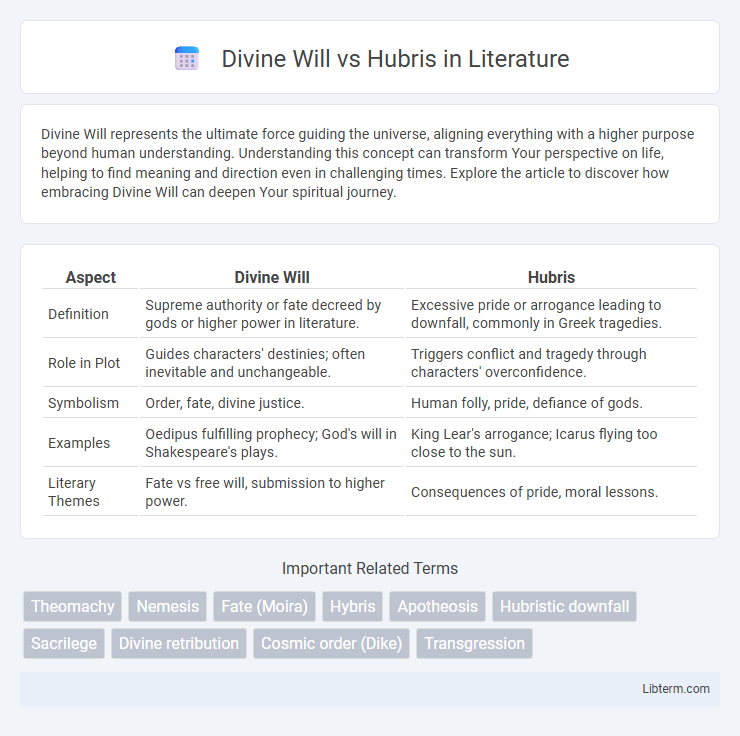Divine Will represents the ultimate force guiding the universe, aligning everything with a higher purpose beyond human understanding. Understanding this concept can transform Your perspective on life, helping to find meaning and direction even in challenging times. Explore the article to discover how embracing Divine Will can deepen Your spiritual journey.
Table of Comparison
| Aspect | Divine Will | Hubris |
|---|---|---|
| Definition | Supreme authority or fate decreed by gods or higher power in literature. | Excessive pride or arrogance leading to downfall, commonly in Greek tragedies. |
| Role in Plot | Guides characters' destinies; often inevitable and unchangeable. | Triggers conflict and tragedy through characters' overconfidence. |
| Symbolism | Order, fate, divine justice. | Human folly, pride, defiance of gods. |
| Examples | Oedipus fulfilling prophecy; God's will in Shakespeare's plays. | King Lear's arrogance; Icarus flying too close to the sun. |
| Literary Themes | Fate vs free will, submission to higher power. | Consequences of pride, moral lessons. |
Understanding Divine Will in Human Affairs
Divine Will in human affairs represents a guiding cosmic order that influences fate, destiny, and moral decisions, often perceived as an omnipotent force beyond human control. Understanding Divine Will requires recognizing its role in shaping events and the importance of humility in accepting outcomes as part of a greater plan. Contrastingly, hubris embodies excessive pride and defiance against this divine order, often leading to downfall and suffering in mythological and philosophical contexts.
Defining Hubris: Roots and Implications
Hubris originates from ancient Greek tragedy, symbolizing excessive pride or arrogance that defies divine authority and natural order. This overconfidence often leads to downfall by blinding individuals to their limitations and moral responsibilities. The concept underscores a profound conflict between human ambition and the boundaries set by divine will, illustrating the consequences of ignoring higher powers.
Historical Perspectives on Divine Will and Hubris
Historical perspectives on divine will and hubris reveal contrasting views on human behavior and fate in ancient civilizations. In Greek mythology, hubris--excessive pride toward the gods--was seen as a direct challenge to divine will, often resulting in severe punishment to restore cosmic order. Similarly, many religious traditions emphasize divine will as an omnipotent force guiding morality and destiny, where hubris represents a transgression disrupting this divine plan.
Mythological Narratives: Lessons of Hubris
Mythological narratives frequently depict hubris as excessive pride or arrogance that challenges the divine will, leading to the inevitable downfall of mortals who overstep their bounds. Stories such as the tale of Icarus illustrate how disregarding divine limits invites punishment, reinforcing the concept that human actions must align with cosmic order. These lessons serve as timeless warnings about the dangers of pride and the importance of respecting divine authority.
Religious Teachings on Submission vs Arrogance
Religious teachings often emphasize the virtue of submission to Divine Will as a path to spiritual harmony and enlightenment, encouraging humility and trust in a higher power's plan. Hubris, characterized by arrogance and prideful defiance of divine authority, is frequently portrayed as a moral failing leading to downfall and separation from grace. Scriptures across faiths underscore the contrast between sincere submission and destructive arrogance, highlighting the importance of aligning human will with divine purpose to achieve righteousness.
Philosophical Approaches to Fate and Pride
Philosophical approaches to Divine Will and Hubris explore the tension between predestined fate and human pride, emphasizing that hubris often disrupts the natural order established by divine will. Classical thinkers like Aristotle argue that hubris results from an excessive assertion of personal power against the cosmos' ordained balance, leading to downfall. Stoic philosophy upholds acceptance of divine will as essential for wisdom, viewing prideful resistance as a root cause of suffering and moral failure.
Literary Depictions of Hubris Challenging the Divine
Literary depictions of hubris depict mortal arrogance as a direct challenge to the divine order, often leading to catastrophic downfall or divine retribution in classical tragedies such as Sophocles' "Antigone" and Aeschylus' "Prometheus Bound." These narratives emphasize the tension between human pride and divine will, illustrating how excessive self-confidence or defiance against gods disrupts cosmic harmony and enforces moral boundaries. By portraying hubris as an existential threat to divine authority, literature reinforces ancient cultural values on humility and the limits of human agency.
Modern Interpretations of Divine Will and Ego
Modern interpretations of divine will emphasize alignment with universal or higher-purpose intentions, contrasting sharply with hubris, which embodies excessive ego and self-centered ambition. Psychological studies link divine will to concepts of surrender and humility, fostering mental well-being by encouraging individuals to transcend personal ego boundaries. Contemporary theological perspectives highlight divine will as a guiding principle beyond human arrogance, promoting ethical living and deeper spiritual growth.
Consequences of Defying Divine Authority
Defying divine will often results in severe consequences such as divine punishment, loss of favor, or irreversible misfortune, reflecting a breach of cosmic order. Hubris, characterized by excessive pride or arrogance against divine authority, typically provokes retribution from gods, leading to downfall or ruin in various mythologies and religious texts. These narratives emphasize the inherent dangers and moral lessons tied to disrespecting or undermining divine power.
Embracing Humility: The Path Beyond Hubris
Embracing humility serves as the essential path beyond hubris by aligning individual will with divine will, fostering genuine self-awareness and spiritual growth. Hubris, characterized by excessive pride and overestimation of one's capabilities, blinds individuals to their limitations and disrupts harmony with higher cosmic order. By recognizing the supremacy of divine will and surrendering ego, one cultivates humility that promotes wisdom, balance, and authentic empowerment.
Divine Will Infographic

 libterm.com
libterm.com